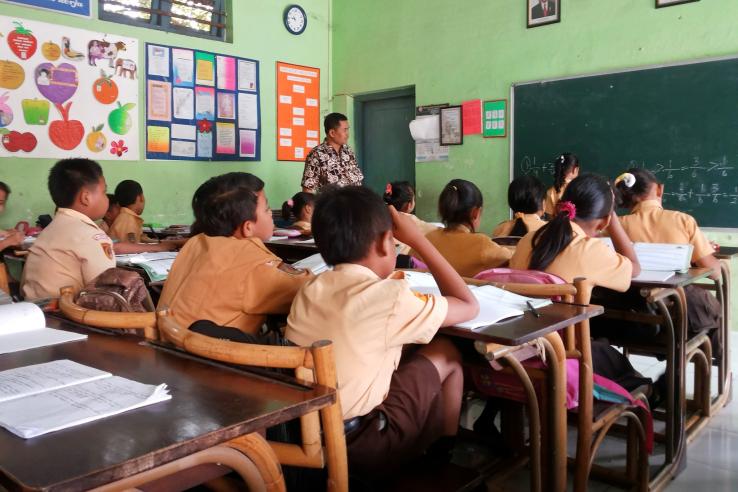J-PAL Southeast Asia at 10: Education

Photo: Erika S. Nugraha | Shutterstock.com
The Medium-Term Impact of Conditional Cash Transfers on Health and Education in Indonesia: J-PAL affiliated researchers Ben Olken (MIT) and Rema Hanna (Harvard) and co-authors Nur Cahyadi (National Team for Acceleration of Poverty Reduction/TNP2K), Rizal Adi Prima (Royal Melbourne Institute of Technology), Elan Satriawan (Universitas Gadjah Mada) and Ekki Syamsulhakim (TNP2K) examined the medium-term impact of Program Keluarga Harapan, the national conditional cash transfer program, on economic, education, and health outcomes in Indonesia. Six years following the introduction of cash transfers, the program resulted in reductions in stunting, increased rates of childbirth in the presence of trained birth attendants, and increased school enrollment. However, the transfers did not lead to transformative economic change for recipient households.
Project Generasi: Conditional Community Block Grants in Indonesia: J-PAL affiliated researcher Ben Olken (MIT) and his co-authors Junko Onishi (World Bank) and Susan Wong (World Bank), partnered with the Government of Indonesia to evaluate the impact of conditional community block grants and the additional effect of performance incentives on education and health outcomes. The findings show that community block grants improved health and education in Indonesian villages, and adding performance incentives sped up improvements in health.
The Impact of Doubling Teacher Salary on Student Performance in Indonesia: J-PAL affiliated researchers Karthik Muralidharan (UC San Diego) and Menno Pradhan (University of Amsterdam and Vrije Universiteit Amsterdam) and their co-authors Joppe de Ree and Halsey Rogers (World Bank) examined the impact of doubling teacher salaries on student and teacher performance in Indonesia. The intervention resulted in some positive effects on teachers, such as higher levels of satisfaction with their jobs, less financial stress, and a lower likelihood to have a second job. However, doubling teacher salaries had no effect on teacher knowledge, student test scores, or self-reported teacher attendance.*
Enabling Young Readers: A Primary School Reading Program in the Philippines: J-PAL affiliated researcher Leigh Linden (University of Texas at Austin) and his co-authors, Ama Baafra Abeberese (Wellesley College) and Todd Kumler (Columbia University), evaluated a 31-day read-a-thon where students were encouraged to read as many books as possible through daily reading activities in school, such as storytelling sessions, reading games, and posters that displayed each class’s progress. The results suggest that encouraging increased use of age-appropriate reading materials by students was a viable strategy for improving students’ reading skills (IPA Philippines). *
Closing the Indonesian Student’s Mathematics Gap: J-PAL affiliated researchers Arya Gaduh (University of Arkansas) and Gumilang Aryo Sahadewo (Universitas Gadjah Mada), and their coauthors Daniel Suryadarma (Asian Development Bank (ADB)), Milda Irhamni, and Takiko Igarashi (ADB) aim to examine the impact of using adaptive learning software and providing training for teachers on student numeracy learning outcomes, learning interest in math, and teacher interest, efficacy, and capability to teach higher-order mathematics skills after one academic year of interventions. The randomized evaluation results are forthcoming.
Adapting the Reach Up and Learn (RL) Program to the Indonesian Context: J-PAL affiliated research Margaret Triyana (World Bank) and her coauthors, Maria Rosales (Rutgers University-Newark), Helen Baker (Bangor University), and Elan Satriawan (Universitas Gadjah Mada) aim to understand the possibility of implementing Reach Up and Learn, a program first introduced in Jamaica using a structured early stimulation curriculum delivered through weekly home visits by community health workers, in Indonesia. The study will replicate the curriculum but will be delivered in a group setting, targeting poor households with 0 to 3-year-olds. Additionally, researchers will test the effectiveness of a complementary component, a father’s engagement in early childhood education. The exploratory study results are forthcoming.
*Not Implemented by J-PAL SEA (i.e., either implemented independently by researchers, partner organizations, or by Innovations for Poverty Action Philippines).